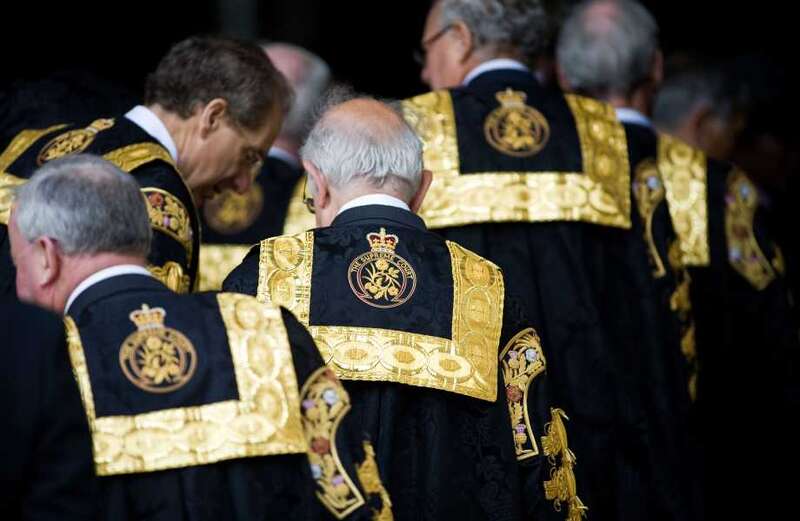WHO needs Keir Starmer to compromise our national energy security and push up our bills when we have the Supreme Court to do it for us?
For months, in common with many business leaders and unions, I have been concerned about what Labour’s promise to refuse new licences for oil and gas extraction would mean for the UK economy.


What I didn’t foresee was that the Supreme Court would beat Starmer to it.
On Thursday it ruled that Surrey County Council was wrong to grant planning permission for oil extraction from a number of small wells near Gatwick Airport without considering the carbon emissions which would be released when the oil went on to be burned.
The council had considered the environmental impact on the immediate area but the judges ruled that it wasn’t enough – they should also have taken into account its impact on Britain’s carbon emissions.
 Spectacular New Year fireworks light up London sky as huge crowds celebrate across UK for first time in three years
Spectacular New Year fireworks light up London sky as huge crowds celebrate across UK for first time in three years
The case effectively withdraws planning permission.
While Surrey Council could theoretically go and reconsider the application again, this time taking into account carbon emissions, it will be an uphill battle for the company wanting to develop the oil wells.
Moreover, the Supreme Court decision brings into doubt all oil and gas projects in Britain – as well as other infrastructure projects.
Road building threat
Presumably, new roads, railways, factories, housing developments will all now be open to challenge in the courts – and face a good chance of being blocked, because they will inevitably produce carbon emissions.
Environmental activists, needless to say, are cheering the Supreme Court judgement, but they should stop and realise that it is an affront to democracy.
Whether or not to develop oil and gas fields, along with roads, houses and everything else, should be the realm of elected politicians.
These decisions require numerous different interests to be balanced against each other.
Environmental concerns need to be weighed against economic ones, and the interests of local residents considered alongside the national interest.
Yet in this case, three unelected judges have effectively seized the right to dictate Britain’s energy policy all by themselves.
These bewigged figures have put into question many thousands of jobs in the oil and gas sector, as well as threatened the interests of all energy consumers.
 Robbie Williams poised to launch his own brand of energy drinks to rival Prime
Robbie Williams poised to launch his own brand of energy drinks to rival Prime
And no one else was allowed a say.
Environmental concerns need to be weighed against economic ones
Ross Clark
It is one more example of how political power is draining away to the courts - just as our elected government finds its efforts to control illegal migration blocked by the Supreme Court and European Court of Human Rights.
Former Supreme Court judge Lord Sumption warned about this when he used the BBC’s Reith lectures in 2019 to argue that “the growing empire of the law” is straying into politics, beyond its remit.
Our elected politicians, however, share a lot of the blame.
Net zero
It was they who, also in 2019, nodded through an amendment to the Climate Change Act which places a legally-binding target for Britain to achieve net zero carbon emissions by 2050.
MPs did not even hold a vote and only debated the issue for 90 minutes – in spite of the huge repercussions for our economy and living standards.
It is that net zero target which now hangs over every planning decision.
Once you have a legally-binding target to achieve net zero emissions green activists are bound to use it to drag the government and other public authorities through the courts at every opportunity.
The idiocy of the Supreme Court judgement that it will do absolutely nothing to cut global carbon emissions – quite the reverse.
Given that, as even Starmer admits, we will need oil and gas for decades to come, however many wind turbines we build, winding down UK production makes no sense.
All it will mean is that we will have to import more oil and gas instead.
That will harm our balance of payments -- and mean a net increase in global emissions.
No realistic plan of how to keep the lights on
Ross Clark
We are importing increasing quantities of gas by ship, which requires it to be liquified before it is transported and then regasified once it gets here – a process which consumes around a tenth of the energy contained within the gas.
What we need is a robust government and parliament which are prepared to assert their sovereignty and take back the power to decide Britain’s energy policy – in a democratic process which recognises the needs of the economy as well as the environment.
But what hope is there of that? We are about to get the worst possible government at the worst possible time.
Labour has tied itself down with completely unrealistic climate targets, such as trying to decarbonise the national grid when it has no realistic plan of how to keep the lights on when our wind turbines and solar farms are producing little energy.
Worse, our next government will almost certainly be led by a former human rights lawyer who will positively encourage the drift of power to the courts.
We face a dark future for democracy – and one which threatens to be literally dark, too.
































